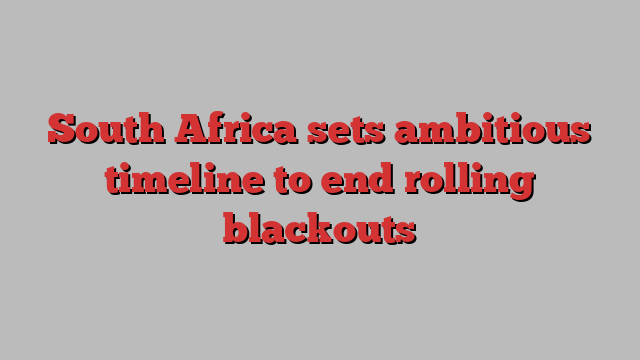
Unlock the Editor’s Digest for free
Roula Khalaf, Editor of the FT, selects her favourite stories in this weekly newsletter.
South Africa’s electricity tsar has pledged that the crippling blackouts that have plagued the country for more than a decade would be largely over by the end of the year, allowing citizens to enjoy “a hot bath” and a home-cooked meal.
The issue of blackouts — known in South Africa as load shedding — is expected to be one of the dominant issues in the May 29 election, in which the governing African National Congress could lose its majority for the first time since democracy in 1994.
Kgosientsho Ramokgopa, who was appointed minister of electricity a year ago to resolve the blackouts, told an infrastructure conference he was confident “there will not be a need for this ministry by the end of the year”.
“More and more you’ll wake up to a hot bath. Much later, you’ll see that you’ll be able to have a cooked meal at home,” he told the conference hosted by asset manager Ninety One.
Speaking later to the Financial Times, Ramokgopa said he expected that before year end, South Africa’s power supply would have stabilised. “The interventions to completely eradicate load shedding will be firmly in motion, only needing implementation of oversight,” he said.
Executives remain sceptical, however, given the proximity to the election and the fact that President Cyril Ramaphosa’s government has repeatedly promised as much before, only for the blackouts to escalate. Last year, Eskom cut power to households and companies for a record 280 days, up from 65 days the year before, for up to 12 hours per day.
“The government is undoubtedly feeling the electoral pressure from the underperformance of Eskom,” Hendrik du Toit, chief executive of Ninety One told the FT. “Before an election, you can expect there will be promises. But at least we’re in a promising phase with the government trying to engage business and fix things.”
Ramokgopa rejected suggestions of an election gambit, designed to ensure voters do not abandon the ANC. Polls project the ANC will slip below 50 per cent in the May election for the first time since democracy. One poll last week by the Brenthurst Foundation and the SABI Strategy Group put its support at 39 per cent, well below the 57.5 per cent it secured in the 2019 election.
“We’re resolving a problem. Even if the elections happen tomorrow, we’ll continue to resolve the problem,” he told the conference. “We’ve suffered the pain, the gain is coming, and they say ‘there’s an election’ [but] there’s no correlation, it’s just science.”
In a swipe at opposition political parties campaigning on the blackouts issue, Ramokgopa said “not everyone is happy that we’re resolving the problem”.
Azar Jammine, chief economist at consultancy Econometrix, said Ramokgopa’s urgency suggested that the “penny has dropped, and the election seems to have focused the government’s mind on what South Africans really need right now”.
But Jammine added that in all probability, any improvement in blackouts was likely to be too late to ultimately change the ANC’s election trajectory.
“Nonetheless, what Ramokgopa is saying provides more hope than we’ve had in a long time, since he provided specific information on where the new power will be coming from — which is detail we haven’t really had until now,” he said.
Mzila Mthenjane, chief executive of the Minerals Council, which represents the largest mining companies including Anglo American and Glencore, said it was vital for the commodities sector that the power crisis was resolved. “The only option we have is just to fix this,” he said. “Without electricity, there is no economy and there is no South Africa.”

